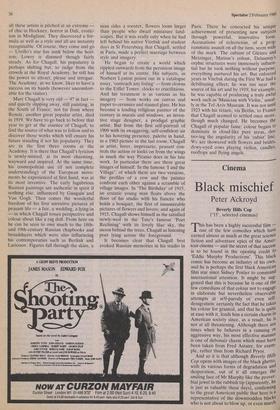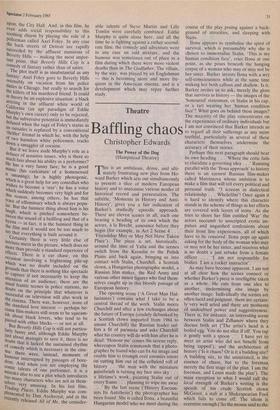Cinema
Black mischief
Peter Ackroyd
'T his has been a highly successful film
I one of the few comedies which have earned almost as much as the great science fiction and adventure epics of the Amer- ican cinema — and the secret of that success is to be found in the opening credit to ' 'Eddie Murphy Productions'. This black comic has become an industry of his own, and he is perhaps the first black American film star since Sidney Poitier to command international attention. It might be sug- gested that this is because he is one of the few comedians of that colour not to engage in elaborate but nevertheless observable attempts at self-parody or even self denigration: certainly the fact that he takes his colour for granted, and that he is quite at ease with it, lends him a certain charm M American society since, as a result, he Is not at all threatening. Although there are times when he behaves in a cunning or aggressive way, his most effective manner is one of debonair charm which must have been taken from Fred Astaire, for exam- ple, rather than from Richard Pryor. And so it is that although Beverly Hills Cop opens with images of the black ghetto, with its various forms of degradation and desperation, out of it all emerges the smiling face of Mr Murphy like the prover- bial jewel in the rubbish tip (apparently, he is just as valuable these days), confirming to the great American public that here is a representative of the downtrodden blacks who is not about to blow up, or even march Upon, the City Hall. And, in this film, he even adds social responsibility to this soothing charm by playing the role of a Policeman called Axel Foley. In any case the back streets of Detroit are rapidly succeeded by the affluent mansions of Beverly Hills — making the most impor- tant point, that Beverly Hills Cop is a comedy of fantasy rather than of satire.
The plot itself is as insubstantial as any fantasy: Axel Foley goes to Beverly Hills ostensibly on vacation from his police duties in Chicago, but really to search for the killers of his murdered friend. It could in theory be an explosive situation: a black arriving in the affluent white world of California (an apt paradigm of Eddie Murphy's own career) only to be rejected, but the subversive potential is immediately defused when the saga of Foley's status as an outsider is replaced by a conventional 'thriller' format in which he, with the help of two harmless white policemen, tracks down a smuggler of cocaine. But if we leave aside Murphy's role as a defuser of sensitive issues, why is there so much fuss about his ability as a performer? He has a very funny face; he is a good Mimic (his caricature of a homosexual is amusing); he is highly photogenic, Which is a great help for any comedian who wishes to become a 'star': he has a voice Which suddenly becomes very high and for
• this reason, among others, he has that trace of effeminacy which is always popu- lar. But the funniest thing about him is his laugh, which is pitched somewhere be- tween the sound of a bullfrog and that of a hyena — in fact, it is the funniest thing in the film and it would not be too much to say that everything is built around it.
Certainly there is very little else of intrinsic merit in the picture, which does no more than provide a standard repertoire of effects. There is a car chase, on this occasion involving a frightening pile-up Which was no doubt included on the grounds that there is nothing like spectacle to capture if not necessarily to keep the attention of an audience; there are the usual frantic scenes in police stations, no doubt on the principle that whatever is successful on television will also work in the cinema. There was, however, none of the standard love interest — perhaps be- cause film-makers still seem to be squeam- ish about black lovers, who tend to be paired with other blacks — or not at all.
But Beverly Hills Cop is still not particu- larly funny and, although Eddie Murphy just about manages to save it, there is no doubt that it lacked the sustained rhythm uf comedy which is necessary in the cine- ma: there were, instead, moments of humour interrupted by passages of bore- dom. And when you are employing the comic talents of one performer, it is a mistake also to use a plot which introduces tou many characters who are not in them- selves very amusing. In his last film, Trading Places, Eddie Murphy was com- plemented by Dan Ayckroyd; and in the recently released All of Me, the consider- able talents of Steve Martin and Lilly Tomlin were carefully combined. Eddie Murphy is quite alone here, and all the time he is fighting against a rather second- rate film: the comedy and adventure were in any case an odd mixture, and the humour was sometimes out of place in a film during which there were more violent deaths than in The Godfather. The villain, by the- way, was played by an Englishman — this is becoming more and more fre- quent in the American cinema, and is a development which may repay further study.











































 Previous page
Previous page